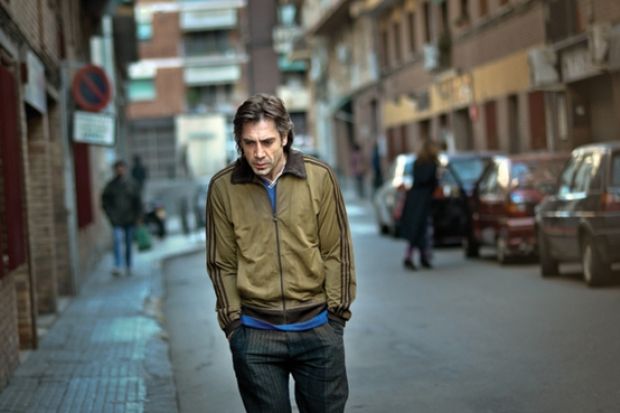Credit: Optimum Releasing
Biutiful
Directed by Alejandro González Iñárritu
Starring Javier Bardem, Maricel Álvarez and Hanaa Bouchaib
Released in the UK on 28 January
Out of the darkness loom two pairs of hands, entwined, tenderly caressing, pointing heavenwards. Voices whisper, a man's and a young woman's. It is only at the film's end, when we return to the scene, that we see that the hands belong to a young daughter and her dying, moments later dead, father.
It is a long time since I have seen a film so marinated in death - yet so at ease with its subject, and so compelling. Death is everywhere. It is not only that for much of the film Uxbal, a small-time hustler, played by Javier Bardem, knows that he is dying from cancer. There are also the dead children who lie in their coffins, and who reappear through the film, as well as the gruesome deaths of a large number of Chinese migrant construction workers who are suffocated by bad heating, their bodies sea-dumped, as if they were drowned trying to enter Spain. But to adapt James Joyce's words, this is a film where in the midst of death we are in life - the life of austerity Barcelona.
Biutiful's Barcelona is anything but the tourist's - there is hardly a glimpse of the Ramblas of the flâneur or of Gaudi's modernist cathedral. Gone are the gaudy colours of the chic city. The city has been bled of colour - even the blues tend to be cold, ice blue.
The film is set in a working-class district of the city, where the Catalonian and Castilian poor jostle Senegalese street sellers and unskilled Chinese migrants. Javier Bardem is the junction box of the film. He negotiates with and pays the police so they leave the Senegalese traders in peace, he does the deal with the site foreman so that the Chinese workers, women with children among them, brought over by Chinese gang leaders, can work on building sites. All his financial transactions seem tainted. But no one can do without money. Out of kindness as well as shame he buys the cheapest heating for the Chinese workers - so cheap that the heaters poison and kill those they were intended to warm. Bardem is always trying for beauty but it comes out wrong, much as his son misspells the word "beautiful" as "biutiful" when he draws a picture of the Pyrenees, where Bardem promises to take him.
His two children live with him rather than their bipolar and promiscuous mother (a tremendous performance by Maricel Álvarez), and we meet him as he learns of his terminal condition and begins to try to put some order into his incurably disordered life.
Bardem is so central to the film that I am almost tempted to call it his film rather than that of the director Alejandro González Iñárritu (even if the director has made death his own in films such Amores Perros and 21 Grams), in the same way that I have often thought that North by Northwest is really a Cary Grant rather than an Alfred Hitchcock film.
By now, Bardem has become the very epitome of a kind of settled manliness (for all the fact that he played the Cuban gay poet Reinaldo Arenas in Before Night Falls) - whether macho as in Jamón, Jamón or deadly as in the Coen brothers' No Country for Old Men. In Biutiful, Bardem is a man trying to make his peace with the public world of work but equally trying to make sense of his internal life. His face is the landscape within which Biutiful operates: very near the end, in an unforgiving close-up his face fills the screen - as it did at times in The Sea Inside, where he played the Spanish ship mechanic quadriplegic wanting the right to choose death.
There is never anything happy-clappy about Bardem. He has made a career out of the disabled and dying. He can't really do happiness - as his disastrous miscasting in Eat Pray Love showed when he played the melancholy divorcee who finds happiness with Julia Roberts. But he does soulfulness better than anyone, which is exactly what Biutiful needs from him: pain, anguish, anger, regret, loss, moody gazing - over these he has mastery. At one point he even does a passable imitation of Jesus as he watches over his sleeping child. But the grotesqueness of suffering eludes him. He is marvellous but within a restricted range.
That, too, might be the judgement of a film that gives heart to those of us who think that the anatomy of melancholy can generate profound affection as well as reflection.
Register to continue
Why register?
- Registration is free and only takes a moment
- Once registered, you can read 3 articles a month
- Sign up for our newsletter
Subscribe
Or subscribe for unlimited access to:
- Unlimited access to news, views, insights & reviews
- Digital editions
- Digital access to THE’s university and college rankings analysis
Already registered or a current subscriber? Login
